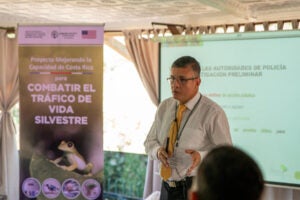
SAN JOSE, Costa Rica—This year, Humane Society International/Latin America has conducted three comprehensive trainings for Costa Rican authorities on how to properly handle wildlife either seized or rescued in police and judicial operations. According to the Judicial Police’s Specialized Section against Environmental Crimes, between 2022 and 2023, 534 wild animals were seized in Costa Rica.
These workshops are part of the “Improving Costa Rica’s capacity to combat wildlife trafficking” project, funded by the U.S. Bureau of International Narcotics and Law Enforcement Affairs and administered by Humane Society International in coordination with Costa Rica’s National Environmental Security Commission.
During the workshops, public officials learned how to properly handle seized or rescued wildlife, how to protect people involved in confiscation processes and how to feed and transport wild animals. They also learned about a new online guidebook designed to help enforcement officers identify different species and to provide them with information on legal protections, conservation status and handling techniques for different animals.
“For the Attorney General’s Office, ongoing training and inter-institutional coordination are key to environmental law enforcement. Knowing how to properly manage seized wild animals, their products and by-products, is the best way to guarantee, first, protection of these public domain assets and, second, appropriate sanctions for people who are illegally hunting and trafficking them,” said Jose Pablo Gonzalez, deputy environmental prosecutor and national environmental security commission coordinator for the Costa Rica Attorney General’s Office.
“The majority of wild animals seized or rescued in police and judicial operations have experienced captivity, stress and abuse. That is why at HSI we seek to support law enforcement authorities so that they are prepared to handle these animals in a humane and safe way, not only thinking about the animals themselves but also the safety and wellbeing of the people involved”, said Andrea Borel, executive director of HSI/Latin America.
Officials from the Ministry of Public Security (police force, national coast guard service, border police and air control) attended the workshops, as well as officials from the Ministry of Environment and Energy (the National System of Conservation Areas, the National Commission for Biodiversity and the Administrative Environmental Tribunal), the National Animal Health Service (SENASA), the Judicial Investigation Agency (OIJ) and the Attorney General’s Office.
ENDS
Media contact: Alejandra Zuniga: [email protected]
